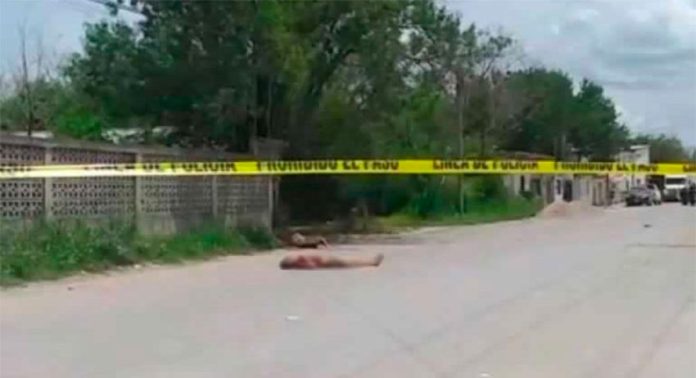Though the motive for the rampage in the northern border city of Reynosa that left scores of civilians dead remains unexplained, security experts point to three possible scenarios: a war within the Gulf Cartel, a political settling of scores, or a mere desire to sow chaos.
Speaking at a press conference on June 21, President López Obrador blamed “armed commandos” for the violence and ordered that an investigation be opened into the string of shootings in Reynosa that has left at least 19 dead.
The attacks in Reynosa, which sits on the Mexico-U.S. border in the state of Tamaulipas, took place in under two hours on Saturday, with people seemingly targeted at random by gunmen traveling in vans, according to local media outlet Elefante Blanco. Those killed included nurses, shopkeepers, taxi drivers, students and construction workers.
Four armed men – presumed to have been among those carrying out the violence – died in a shootout with authorities, Elefante Blanco reported. Two women who had allegedly been kidnapped by the gunmen were rescued.
While Reynosa is a major criminal hotspot on the border and regularly sees shootouts between gangs, violence on this scale had not been seen for at least four years.
1. Gulf Cartel showdown
Reynosa, along with other border cities such as Matamoros and Nuevo Laredo, has long been a bastion for the Gulf Cartel. This major criminal group has enjoyed a period of stability in northeastern Mexico after the weakening of the Zetas, its main rival.
However, the Gulf Cartel has not been able to avoid the fragmentation that has weakened so many of Mexico’s principal criminal groups. According to Guadalupe Correa-Cabrera, an expert on U.S.-Mexico affairs at George Mason University in Virginia, the Gulf Cartel’s control of criminal economies at the border is being contested by a number of rivals.
“Today, we cannot speak of just one Gulf Cartel faction at the border, they don’t operate in a cohesive manner … there are various groups,” Correa-Cabrera told InSight Crime.
“There is also the presence of various groups previously associated to the Zetas … many of them are not just dedicated to drug trafficking but also kidnapping, extortion, oil theft and piracy,” she explained.
One of the Zetas’ notable splinter groups is the Northeast Cartel, which has steadily gained ground in northeastern Mexico over the last three years and has aggressively challenged the control of the Gulf Cartel.
These clashes have left a bloody trail. In late April, the Northeast Cartel allegedly killed and burned the bodies of eight people linked to the Gulf Cartel in the town of Camargo, 75 kilometers west of Reynosa. In March, the two criminal groups fought a running battle for an entire day between the municipalities of Matamoros and Rio Bravo.
With fighting between the Gulf Cartel and the Northeast Cartel has been reported in Reynosa since 2017, it is likely the recent shootings are connected to this dispute or another of the Gulf Cartel’s feuds.
“One possibility is that [the events in Reynosa] were linked to protecting territory,” said Marisol Ochoa, a Tamaulipas security expert at Mexico’s Iberoamericana University, in an interview with InSight Crime.
2. Political realignment
Another hypothesis is that the shootouts were due to the recent political upheaval seen in Tamaulipas.
The state’s governor, Francisco García Cabeza de Vaca, is a fugitive. Having had his political immunity stripped, he faces a warrant for his arrest on charges of ties to organized crime. Back in 2004, an investigation indicated that, while running to be mayor of Reynosa, he had allegedly received bribes from the Gulf Cartel in exchange for protection.
The National Action Party, to which García belongs, recently lost its majority in Tamaulipas’ legislature, which may have forced criminal groups to try and seek leverage and forge new agreements with politicians.
“The well-known participation of security authorities in criminal acts in Tamaulipas indicates that organized crime has always counted on a degree of protection … The current political realignment could be creating instability,” Correa-Cabrera told InSight Crime.
3. Create climate of fear
Ochoa also suggested to InSight Crime that the violent rampage could have been due to a third, simpler option. According to her, these actions were not necessarily part of some calculated plan but simply sought to dispel any sense of security among the population.
“[The events in Reynosa] appear to have been improvised; 14 civilians died who were not involved [in organized crime] … it was a very disorganized operation. It’s not necessarily clear what settling of scores may have taken place here,” said Ochoa.
As Reynosa has undergone a recent period of relative stability without many violent acts of this magnitude, an armed group may have been seeking to create conflict.
“Sowing fear among the general population is also a tool for criminal groups,” Ochoa told InSight Crime.
Reprinted from InSight Crime. Victoria Dittmar is a writer with InSight Crime, a foundation dedicated to the study of organized crime.
